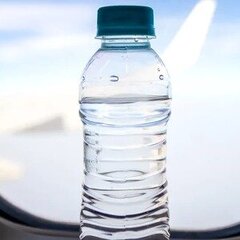
ADVERTISEMENT
Avoid Consuming Water While Onboard an Aircraft. Here’s the Reason Why
Flying is an exciting and often necessary part of travel, but it comes with its own set of challenges and considerations. One of the most overlooked aspects of air travel is hydration, and more specifically, the water served onboard. Despite its seemingly innocuous nature, experts advise against drinking water on planes, and for good reason. Whether it’s for speed of service, health effects, or even sanitary reasons, there are some drinks you’ll want to avoid on your next flight.
The Dangers Lurking in the Sky: Why You Should Avoid Drinking Water on a Plane
High Risk of Contamination
Airplane water tanks and pipes are not immune to contamination. In fact, studies have shown that the water stored onboard planes can contain bacteria such as E. coli and coliform, which are indicators of fecal contamination. This contamination can occur due to various factors, including inadequate cleaning of water tanks and improper maintenance of plumbing systems.
Bacteria Breeding Ground
The environment inside an airplane is conducive to the proliferation of bacteria. The confined space, recycled air, and high passenger turnover create an ideal breeding ground for germs. Additionally, water tanks on planes are often replenished at airports where water quality may not be closely monitored, further increasing the risk of bacterial contamination.
Potential Health Risks
Consuming contaminated water can lead to a range of health issues, from mild gastrointestinal discomfort to more serious illnesses. Symptoms may include nausea, vomiting, diarrhea, and in severe cases, even infections such as gastroenteritis or hepatitis. Individuals with weakened immune systems, such as the elderly or those with underlying health conditions, are particularly susceptible to the adverse effects of contaminated water.
Alternatives to Water: What Should You Drink Instead?
Given the potential risks associated with airplane water, it’s essential to consider alternative beverages during your flight. Opt for bottled beverages, juices, or soft drinks that have undergone proper sanitation and are less likely to be contaminated. Additionally, tea or coffee made from boiled water can be safer options, as the heat kills harmful bacteria.
Staying Hydrated Without Water: Tips for Long Flights
While avoiding water may seem challenging, there are several ways to stay hydrated during long flights without relying on onboard beverages. Consider bringing your own reusable water bottle and filling it with bottled water before boarding. Pack hydrating snacks such as fruits and vegetables, which can help replenish fluids. Furthermore, limit your consumption of alcohol and caffeine, as they can contribute to dehydration.
Myths and Misconceptions: Debunking Common Beliefs
Isn’t Airplane Water Safe?
Contrary to popular belief, airplane water is not always safe for consumption. While airlines are required to adhere to certain regulations regarding water quality, instances of contamination still occur due to various factors beyond their control.
Aren’t Airlines Required to Provide Safe Water?
While airlines are indeed required to provide potable water onboard, ensuring its safety can be challenging. Factors such as the age of the aircraft, maintenance practices, and water source quality can all impact the cleanliness of onboard water.
Can’t I Just Use Bottled Water from the Plane?
While bottled water provided by airlines may seem like a safer option, it’s important to remember that the source of the water used to fill these bottles can vary. In some cases, it may come from the same onboard tanks as tap water, posing similar risks of contamination.
ADVERTISEMENT
Conclusion: Prioritizing Health and Safety in Air Travel
In conclusion, while it may be tempting to quench your thirst with a refreshing glass of water during a flight, it’s best to err on the side of caution and opt for alternative beverages. By avoiding water on planes and choosing safer alternatives, you can reduce the risk of potential health hazards associated with contaminated water. Remember to stay hydrated, pack accordingly, and prioritize your health and safety during air travel.
Thank you. I never knew this but I always get juices,
This information is very valuable.
Thank you for giving such important and health related tips
Thank You a lot!!
One can always go for bottled water. May be on payment basis as well.
Well, I rarely drink water on a plane. I mostly go for something alcoholic because it’s free, tastes great and the more you drink the more fun it is.
Thank you for this message
What about bottled water? Or bottled water purchased before boarding?
Thank you for the tips
Thank you
Thank you for the information it was greatly appreciated have a blessed day .